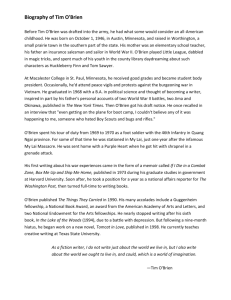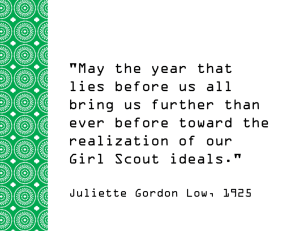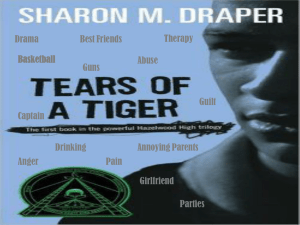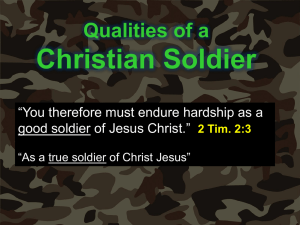Death Reveals a Beauty in Life
advertisement
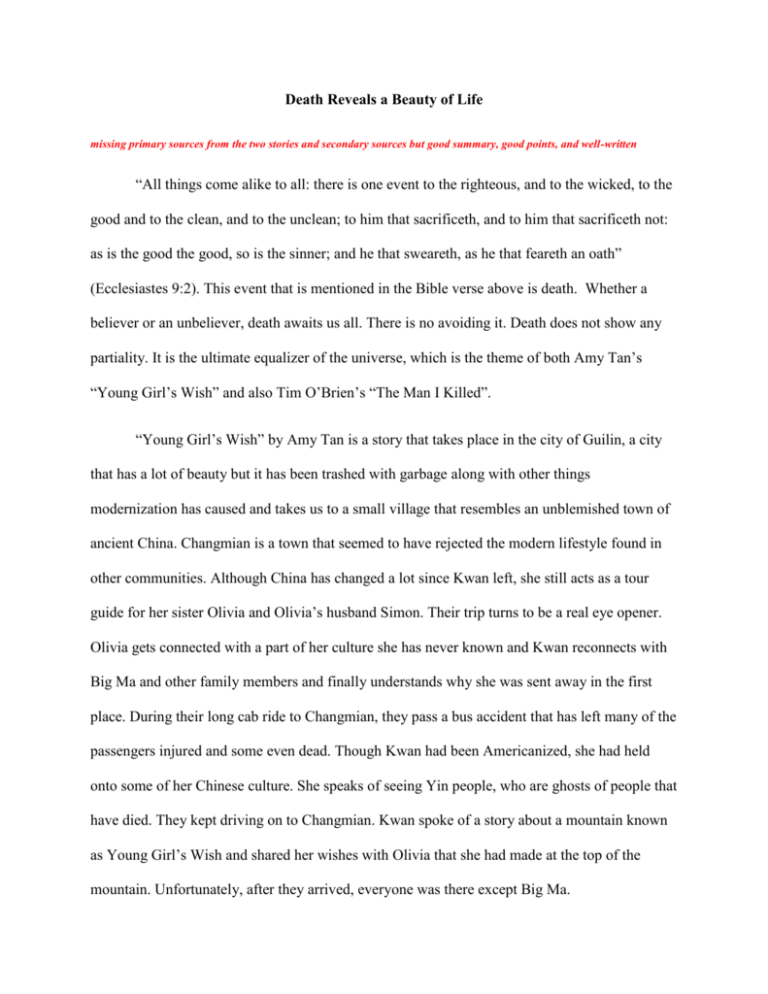
Death Reveals a Beauty of Life missing primary sources from the two stories and secondary sources but good summary, good points, and well-written “All things come alike to all: there is one event to the righteous, and to the wicked, to the good and to the clean, and to the unclean; to him that sacrificeth, and to him that sacrificeth not: as is the good the good, so is the sinner; and he that sweareth, as he that feareth an oath” (Ecclesiastes 9:2). This event that is mentioned in the Bible verse above is death. Whether a believer or an unbeliever, death awaits us all. There is no avoiding it. Death does not show any partiality. It is the ultimate equalizer of the universe, which is the theme of both Amy Tan’s “Young Girl’s Wish” and also Tim O’Brien’s “The Man I Killed”. “Young Girl’s Wish” by Amy Tan is a story that takes place in the city of Guilin, a city that has a lot of beauty but it has been trashed with garbage along with other things modernization has caused and takes us to a small village that resembles an unblemished town of ancient China. Changmian is a town that seemed to have rejected the modern lifestyle found in other communities. Although China has changed a lot since Kwan left, she still acts as a tour guide for her sister Olivia and Olivia’s husband Simon. Their trip turns to be a real eye opener. Olivia gets connected with a part of her culture she has never known and Kwan reconnects with Big Ma and other family members and finally understands why she was sent away in the first place. During their long cab ride to Changmian, they pass a bus accident that has left many of the passengers injured and some even dead. Though Kwan had been Americanized, she had held onto some of her Chinese culture. She speaks of seeing Yin people, who are ghosts of people that have died. They kept driving on to Changmian. Kwan spoke of a story about a mountain known as Young Girl’s Wish and shared her wishes with Olivia that she had made at the top of the mountain. Unfortunately, after they arrived, everyone was there except Big Ma. Tim O’Brien’s story tells of his guilt which came from killing a young Vietnamese soldier in the Vietnam War. Though he knows nothing about the man he killed, he makes up a story in his head that describes the man similar to himself, which makes it harder on himself. His fellow soldiers try to talk to him about it, but O’Brien expresses an implicit silence. However, throughout this silence he focuses on a butterfly and a small blue flower under the dead man’s head which lessens the guilt he is feeling and shows him that life goes on. The deaths described in these two stories were in two totally different situations but they still had similarities. Both mention that the people who have died will no longer be able to make memories and the ones left behind feel a since of guilt, it doesn’t matter if it’s a soldier, a parent, or a complete stranger, death is one thing everyone has in common. It does not discriminate, making us all equal. When a person dies all that is left are the memories. Whether they are good or bad, memories are the only things people can hold onto in order to feel that the one who has passed is still here. Though many people believe different things, some believe that after death there is nothing more. That is it: game over. There are some people who believe that once dead they are reincarnated and then there are the people who believe that once dead they go to a place similar to what Christians call Heaven. Wherever it may be and whatever their beliefs are, they will no longer be able to make new memories with the people they left behind. The characters in both stories felt guilty about the death involved in them. That is true for most people. At the moment when someone dies, people’s emotions are all mixed up. People begin to feel confused, angry, sad, and guilty possibly other emotions than these. O’Brien feels guilty because he killed a young Vietnamese soldier who looked as if he were not a fighter but a student who was picked on in school. Basically, what Tim did was portray the man in a way that is extremely similar to him. Coincidently, he caused more guilt and torture among himself. But he felt bad because he TOOK his life. He was took him from his life and what he may have had. Kwan began feeling guilty about all the time she spent away from Big Ma. She was guilty that she had not arrived sooner, so maybe she wouldn’t have boarded the bus. However, the taxi driver felt guilty also because he did not stop when they saw the accident. People deal with death every day. It doesn’t matter about their nationality, ethnicity, sex, sexual orientation, or anything; we all have to deal with death somehow. As in “The Man I Killed” it can be a soldier fighting in a war, with killing being the only way a solider can protect oneself. If Tim didn’t shoot the man, someone else would have or he could have possibly shot one of the Americans. Either way it involved death, there was no avoiding it. That is what war consists of. Once dead it doesn’t matter what rank you were, you are all the same afterwards. In “Young Girl’s Wish” it was Kwan’s aunt who had raised her after her mother passed and father left. It was the woman she loved most in China, and she had been taken by a bus accident, an accident that she passed on the way to her home to visit her. It can be the most loving person or the most hateful, but they will both eventually die. Death is part of everyday life. Everyone goes through it one day and no one knows when their time will come. We are equal in this aspect. The rich are no longer rich and the poor no longer poor. Once someone dies the memories end, people only have what they left to hang onto. Death causes a bunch of different emotions but after a while we begin accept it. Life goes on after death, like the butterfly and flower in “The Man I Killed”, the flower didn’t wither up and the butterfly didn’t fly away, it went along with its life. In “Young Girl’s Wish”, the people did the same. They went on with their lives. Death reveals a beauty of life one may have never seen, sometimes even in the most tragic incidents.

